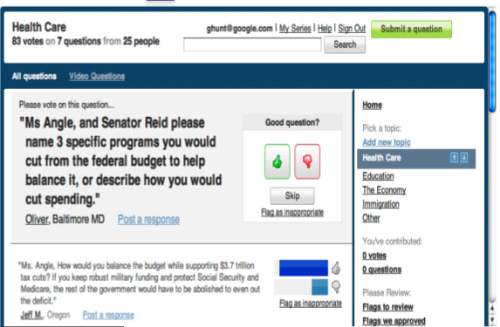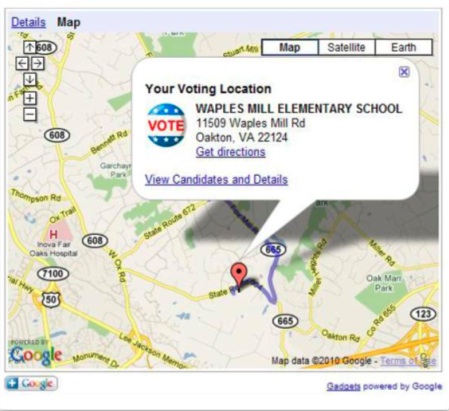In a previous post I highlighted Google’s map of political poll results and invited news sites everywhere to get it and embed it for free. It’s an easy way to display information that readers probably want to see on the sites they read, but that overworked newsroom/graphics teams might not want to spend time illustrating. But it turns out there are several more tools that Google is pushing this election season that deserve the same kind of nudge.
Google Moderator, developed for internal use during company-wide meetings but now available for everyone else, is a tool that allows sites to quickly collect comments or questions from readers. Users submit feedback while voting on everyone else’s feedback, so “the best ones rise to the top.” (See this post on Google’s Public Sector blog for instructions on how to customize and then embed it.)

Some news sites’ comment threads have a similar-looking thumbs up/down feature, but I’m guessing that Google’s algorithm magic makes this a lot faster and more sophisticated than most. Google also recommends that sites pair Moderator feedback with special live campaign events online, like YouTube-hosted debates between local candidates.
YouTube is another tool that Google is urging news sites to take advantage of. The benefit of using “YouTube Direct” is that news sites can solicit videos from readers without having them ever have to leave the site to upload to YouTube; they can also personalize the interface with the news organization’s logo and colors, etc. YouTube Direct has a built-in “moderation panel” for editors to be able to review submitted video and give it the OK before broadcasting it on their sites.
Finally, Google Election Center is an app that Google developed for websites and mobile platforms to give voters the basic information they need to vote: where their polling place is, whether they are registered, and who is on their ballot. Basic information, yes, but if you’re like me, you’ve had a surprisingly hard time finding this stuff out online in previous years.

Now local news sites can customize the app for state-specific information, personalize it with their logo, and help their readers find out what they need to know to vote, quickly and easily.

All of these tools were developed by a small research team at Google focusing on projects in the public sector. These particular efforts fall under the PEW-funded Voting Information Project, which has the goal of standardizing how states and counties gather and disseminate information for voters.
“Because we’re under ‘research,’ we have a lot more flexibility in terms of focusing on information problems that it’s not in anyone’s real business interest to solve,” said Ginny Hunt from the public sector research team in an interview last week. “We asked, what are some big chunks of information that people should have direct access to?” Polling information, of course, is one of them.
Hunt continued: “Our overall approach is, we want to help election boards have the same sophisticated tools at their disposal as a Fortune 500 company. In most cases, they can’t afford to. Our goal is to help them do the best they can with the resources they have, which is why, from our perspective, it has to be free.”
Since these are open source projects, created for the public good, the benefits do not have to be limited to election board websites; Hunt said that her team expects news organizations will use the applications, too. She said that they hope news sites can use the tools as their “default” platform—so that the newsroom staff can get vital information to their readers, while devoting precious reporting time to, well, actual reporting.
“This information is pretty difficult to gather,” said Hunt. “And so we’re putting it out as a baseline, so people don’t need to spend time finding polling place information when they could be out finding great stories, putting more resources into that.”
Lauren Kirchner is a freelance writer covering digital security for CJR. Find her on Twitter at @lkirchner
